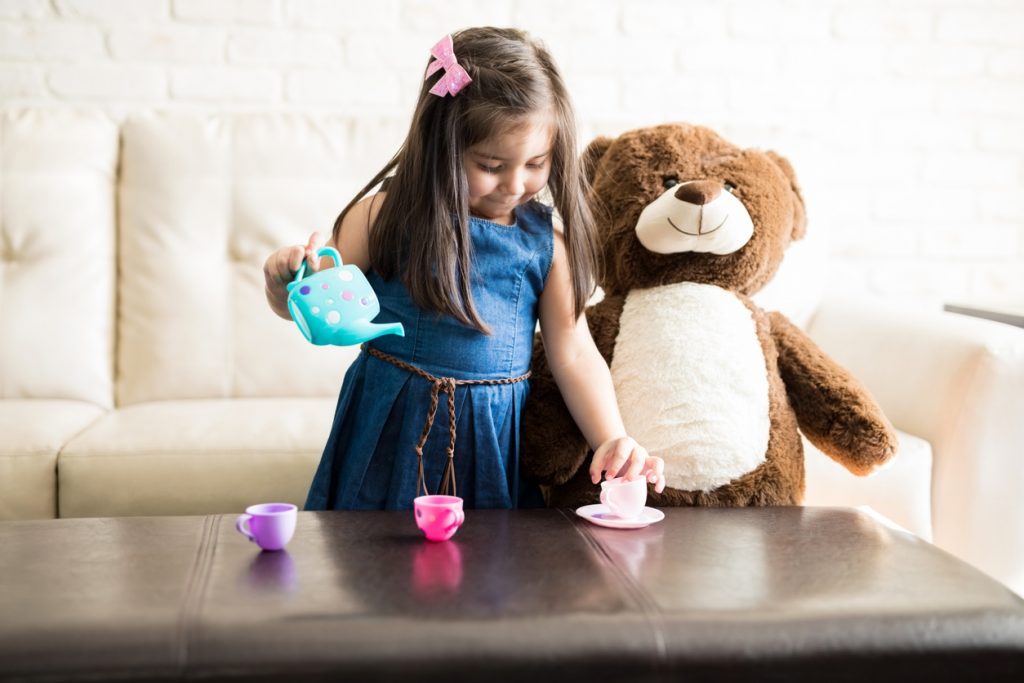It is not uncommon to see young kids, usually toddlers, playing with imaginary friends and even telling us fantastical stories about their imaginary companions. Their pretend friends may be other children, animals, mythical creatures, or a toy or stuffed animal that has “come alive!” They are excited to share stories about their invisible friends, even complain about fights and arguments with their made-up buddies. It might leave parents wondering if their child is normal, or if they are lonely or stressed to have resorted to such make-believe companionship.
Imaginary Friends are Normal
Children have imaginary friends mostly because it is fun and because these friends are always accessible to them for company. Most children know that these friends are not “really real,” but to them, the comfort from the companionship is real. Children’s imaginations begin developing around 2½ to 3 years of age, marking the start of pretend play. A study from 2004 showed that as many as 65% of children up to the age of seven had imaginary companions at some point during their lives. Although toddlers might flaunt their imaginary friends more openly, results showed that school-age children interact with imaginary characters as much as preschoolers.
While parents and healthcare professionals wonder if and to what extent imaginary friends are normal in childhood, research over the decades has shown that imaginary companions are a normal part of childhood in some children and may have some distinct benefits in the child’s development. A recent study from 2017 showed that 60% of children had more than one imaginary companion, and these companions can help children with problem solving and management of emotion, exploration of ideals, companionship for fantasy play, overcoming loneliness, and allowing children to explore behavior and roles. It was interesting to note that imaginary acquaintances mostly took human form (67%), with 19% taking animal forms.
Imaginary Friends Create Healthy, Confident Kids
The company of these dreamed-up allies may last for a few days to sometimes years of your child’s life. These friends may change in number and nature. However, kids with invisible friends are not more likely to be lonely or shy than other children, as sometimes misinterpreted by some adults. Children with imaginary friends are usually highly creative and confident. For parents, these pretend friends are nothing to worry about unless there are other warning signs in a child’s development. In fact, hearing or watching your child’s interactions with these invisible friends can give you an honest glimpse into your child’s thoughts, emotions, likes, and dislikes. Imaginary friends can also help your child socialize and empathize better with other children. Research has shown that not only do kids with made-up pals have as many real friends as other kids, but they also tend to be more confident and outgoing.
Boundaries for Success
Indulging your child’s fantasy friends may foster understanding and bonding with your child and make them feel loved and respected. Often, asking them questions about what their companion is up to, and following along with your child’s stories, helps you understand your child from newer perspectives. However, it is up to each family to decide the extent of this indulgence. It is important to ensure that your child is not using their imaginary friends to divert ownership of their actions, waste resources, or disrupt family interactions.
While it is okay to offer cookies to your child’s “friend” every night, it is not okay to throw away those cookies because your child does not want anyone else to take them. While it is okay to allow your child’s “companion” to join you in the car to visit grandma, it is not acceptable to miss a family event because the imaginary friend just wants to play at home that day.
Not all children have or need imaginary friends. While some children enjoy the companionship of these make-believe friends, others might enjoy other forms of creative activities such as building blocks or coloring or playing with toys. So, a lack of imaginary friends should not concern parents. However, if there are other warning signs in your child’s development, such as severe anxiety around other children, repeated attribution of vivid details of trauma to a particular imaginary friend, or your child is blaming hateful or unacceptable behaviors on their imaginary friend’s influence, then parents need to start delving deeper and exploring more into underlying causes or psychological problems in the child.






Comments